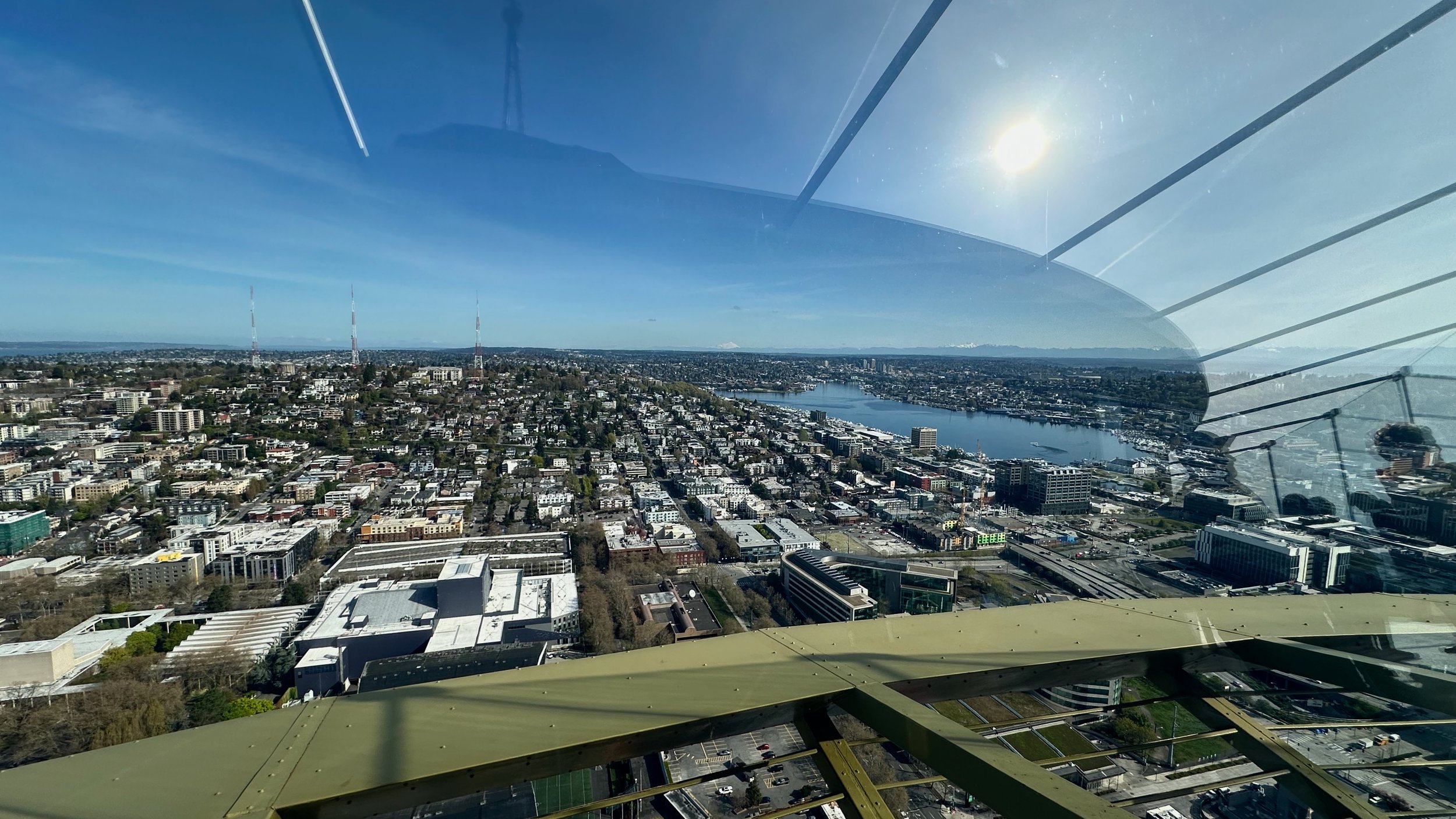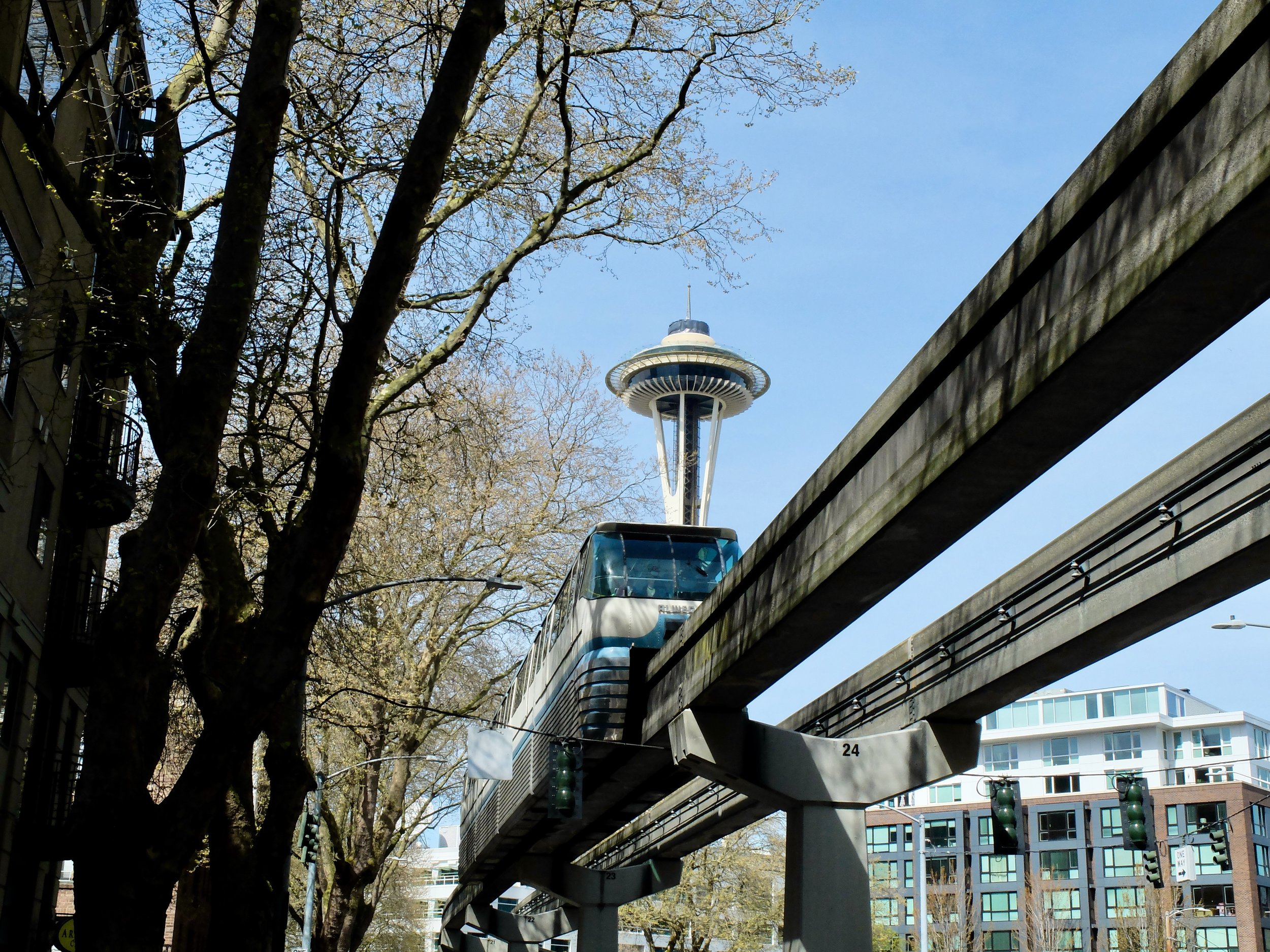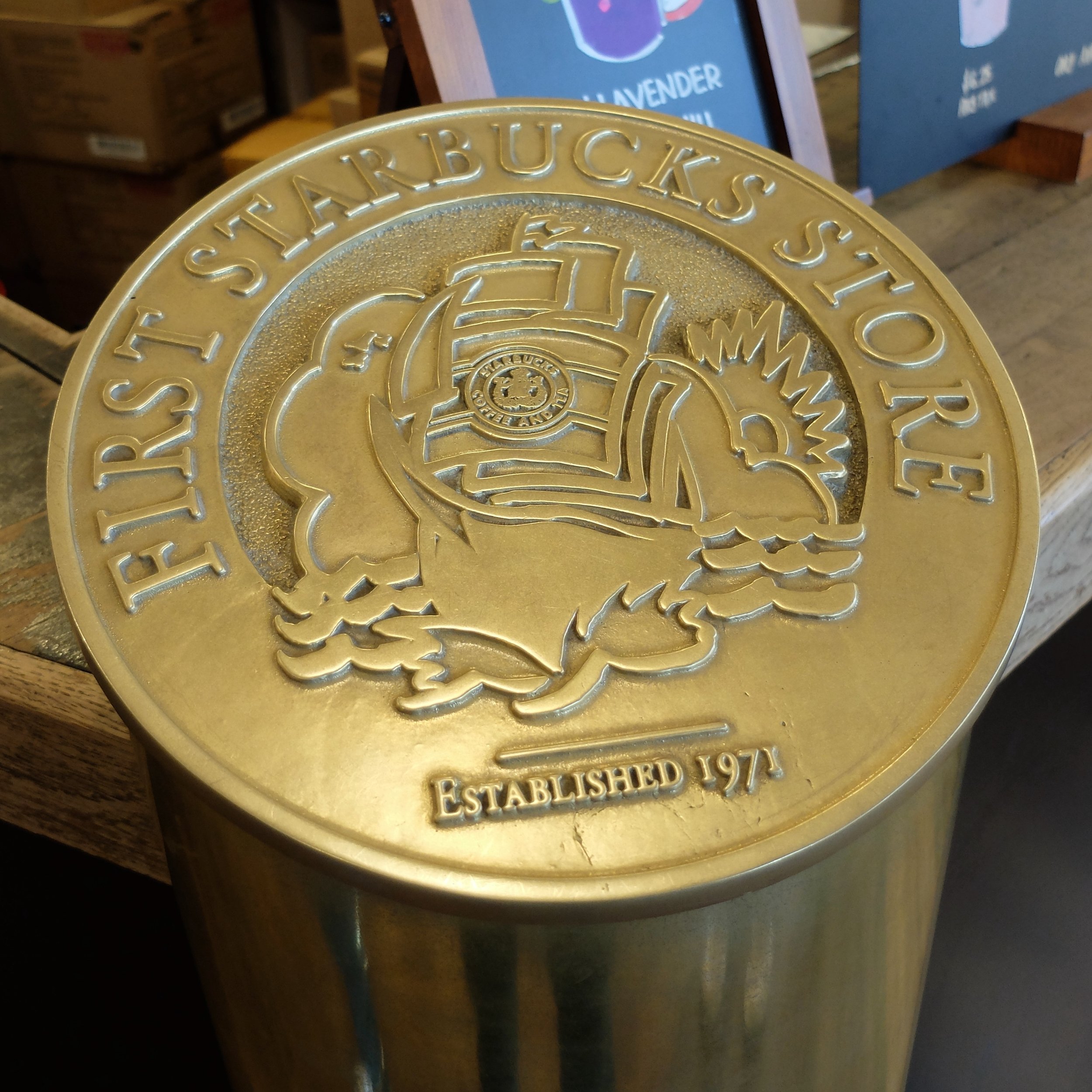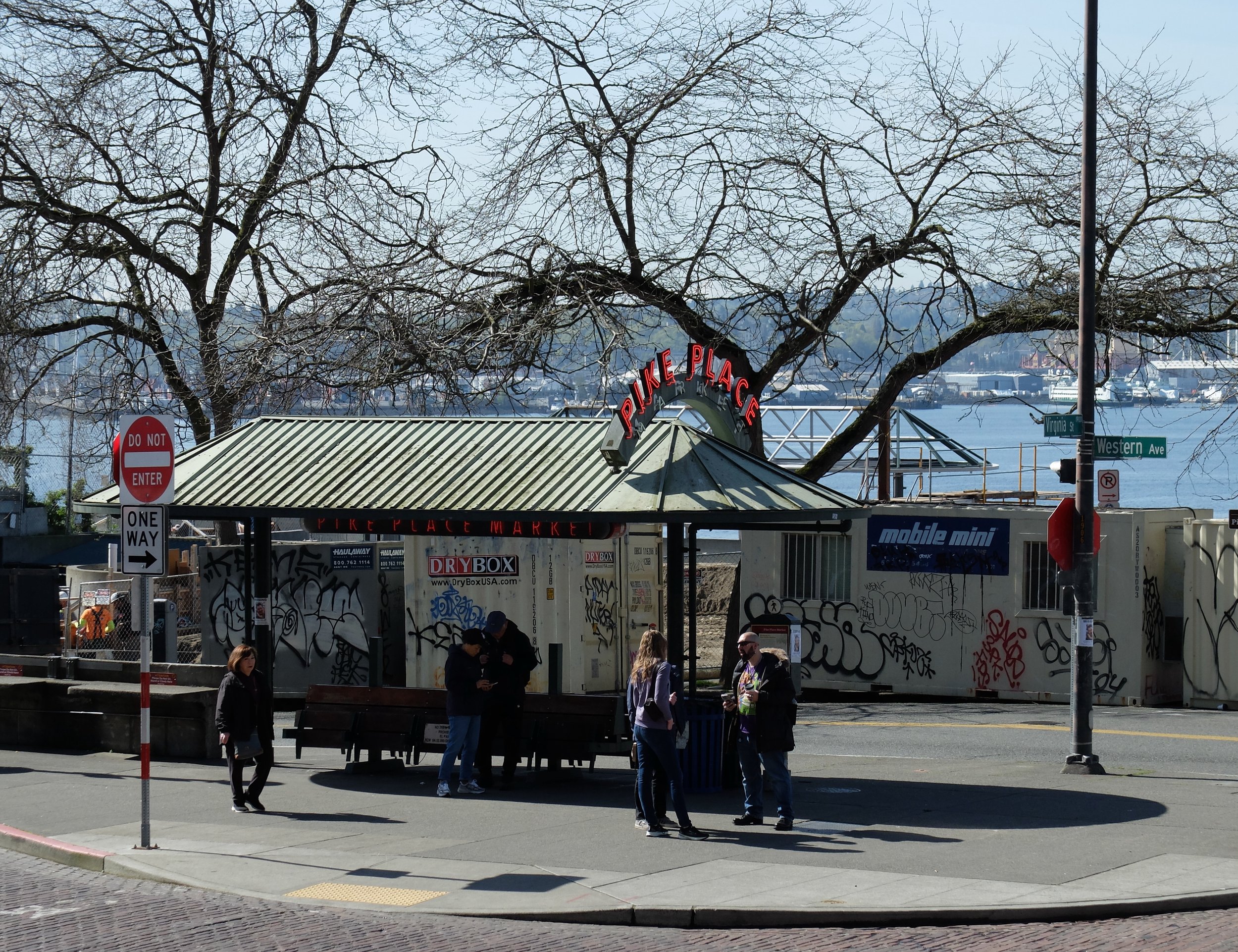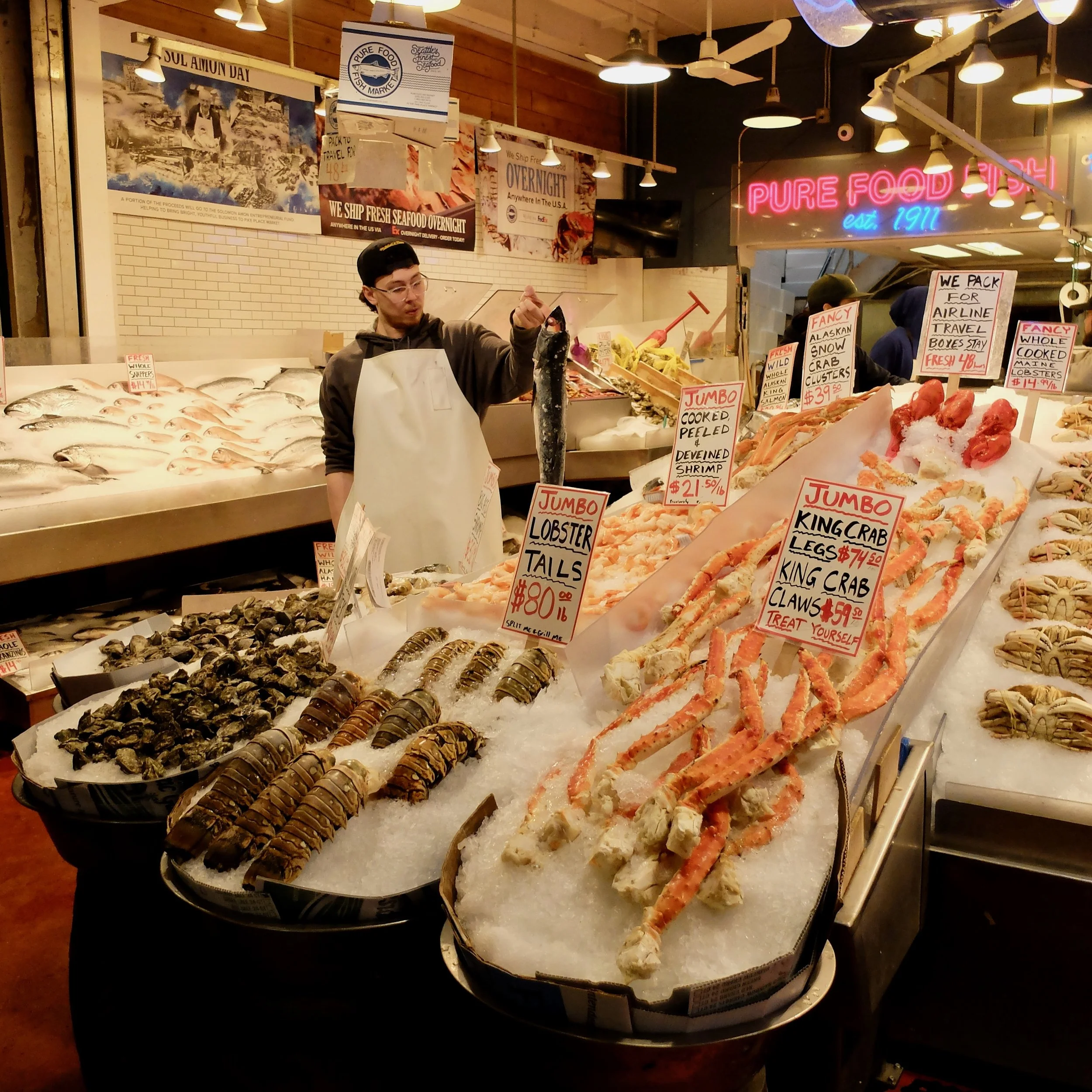Seattle
09 April 2024
Deserted when I returned at 21:30 last night, the Far West Motel car park is now full of pickup trucks, all having their engines started at 05:00 in the morning. These look like regular models but are 50% bigger than the norm in every dimension. The drivers are all lumberjacks, heavily bearded in check-shirts and milling about, drinking coffee, smoking and laughing heartily. They too are 50% bigger than the norm so I don’t complain or ask why it’s necessary to start them up and leave them running for twenty minutes before driving off.
The rain has stopped but it’s still desperately cold. The puny fan-heater in the room has not made much difference to my still-damp kit. It instantly absorbs the cold as I set off, first to Port Angeles and then wheel south, towards the jigsaw of islands, promontories and peninsulas that ends with Eagle Harbour at Bainbridge and the 37-minute ferry to Seattle.
This route around Mount Olympic and the National Park that bears its name that I’ve taken will be superb in the right conditions. I only get about thirty minutes of blissfully warm sun before the clouds gather and the heavens open multiple times in the 110 miles to the port. The region is all lakes, mountains and pines: the similarities with Bavaria are uncanny so I’m only half-surprised to see a sign wishing me “Wilkommen to Bainbridge.
While waiting, a ferry terminal worker who rides a battered-looking GS1100 gently takes the piss out of my bike and asks about the trip. When I tell him I’m planning to ride the Ice Parkway after Vancouver Island and city, his response is simple: “Don’t; you’ll get into trouble”.
In a ‘normal’ year, weather-wise, he reckons I’d be about four weeks too early anyway, but this year is unlike anything he can remember. And he has many more birthdays behind him than ahead. Ordinarily, he would expect 22 or 23 degrees centigrade at this time of year but it’s only 8. He suggests the “real” conditions around Jasper & Banff will be much worse than the forecast suggests.
I hate being beaten by the weather but I can’t ignore the advice. The barman the night before said something similar, and the Apple Weather app indicates a worsening outlook for the next ten days.
I consult my friend Richard, who suggests I instead stay a couple of nights in the wine country, south-east of Seattle. He remembers there are a handful of ritzy little towns replete with wineries and good restaurants. Buoyed by this suggestion, I look at various options, sat at the bar of Rocco’s. This is the city’s best-regarded pizza restaurant and with good reason. But $101 for an albeit extremely good beetroot and goat’s cheese salad, two slices, a couple of beers and a glass of wine? Purlease…
Of course, the underlying issue here for me is not the price in $s but what that translates to in £s. When I first started coming to the US frequently in the mid-90s, the exchange rate was about $2.20 for each £1. This would make this bill around £45, which is what it should be, bearing in mind it was excellent. But it was £80 in real money…
Unfortunately, the exchange rate reflects what the world thinks of the UK’s long-term economic prospects. At a base level, people hold £s if they are planning to buy things ultimately priced in £s and the UK’s chronic productivity growth problems mean there is less ‘stuff’ ultimately priced in £ that people want to buy.
Factor in educational standards failing to keep pace with peer nations, a bloated and inefficient public sector, a punitive but supposedly ’progressive’ tax code of such Byzantine complexity that it actively discourages work, the legacy of the pointless lock-downs of Covid and the depressingly predictable, self-inflicted disaster of Brexit, you’d have to be a supreme optimist to see the two-for-one deal returning any time soon.
Back to the bar at Rocco’s and I’m still intrigued by the German influences. A bit of Googling reveals that German immigration to Washington State began in earnest in the 1840s. Farmers were attracted by low land prices compared to paying cripplingly high rents, extorted by the Catholic church, the dominant landowner. There was a healthy demand for forestry and logging expertise and labour which attracted other Germans, particularly from the south. A bit more Googling finds Leavenworth, about 80 miles southeast of Seattle, which is modelled on a Bavarian town. This forms part of the revised route, now the Ice Parkway is no longer an option.
10 April 2024
All this sorted, it’s time to enjoy Seattle and what a joy it is. First stop is the ‘Space Needle’. Built for the 1962 World’s Fair, it’s an innocent, optimistic throwback to a post-WW11 world of supreme optimism, and brings to mind Donald Fagen’s 1982 song, ‘IGY’ (International Geophysical Year) describing the 1957 event a few years previously in New York.
La Fagen is more famous as one-half of cynical, smart-arse combo, Steely Dan so the lyric has been subject to revisionist interpretation. Taken at face value though, it captures, the excitement of the space race, the absolute certainty that America will win and, presciently - remember 1982 is now forty-two years ago - the world as it is now, dominated by industries that Seattle is home to significant swathes of:
Get your ticket to that wheel in space while there's time
You'll be a witness to that game of chance in the sky; you know we've got to win
Here at home we'll play in the city; powered by the sun
Perfect weather for a streamlined world
There'll be spandex jackets, one for everyone…
A just machine to make big decisions
Programmed by fellas with compassion and vision
We'll be clean when their work is done; we'll be eternally free, yes, and eternally young
After a day here, it’s easy to see why local-boys-made-very-very-good Bill Gates, Howard Schultz and relatively new arrival Jeff Bezos, (Microsoft, Starbucks and Amazon respectively) and many others have either never moved out or made it home as, in many respects, it’s a perfect city…
Big enough to have all the attractions you could feasibly want but without feeling overbearing and surrounded by the most arresting, natural sights. Everywhere you look is water or mountains, and today, viewed through crystal clear air. Nobody appears very well-dressed nor badly-dressed, very rich nor very poor, or even very young or very old. It’s just all chinos, beanies, ’sensible’ boots and tops in anticipation of the inevitable squalls. Homogenised is a just but lazy insult.
It’s easy to imagine the local billionaires love that they can mooch around and blend in perfectly. Providing you can stump up 1,000-bucks for a Montcler 'gilet' or Patagonia storm jacket, you might be one of them.
The famous market at Pike’s Place is a slight disappointment as there only appear to be a few fishmongers left. The other pitches have been taken over by people flogging stuff that does not need to be sold at a fresh market: single-estate Balsamic vinegar and olive oil, for example, or jewellery with no provenance to the area.
It’s still worth a visit as the authentic traders who remain are great theatre, spontaneously breaking into communal singing of sea-shanties as they throw fish around and gut them. Strolling through with a coffee from the original Starbucks store on the same street - providing the line is not too long - is a great way to spend the morning.
The city is also a real cultural melting pot with a strong Asia-Pacific presence to counter-balance the obvious Northern European heritage. It’s far from a cauldron of ethnic tensions though, more like a Le Creuset casserole pot, bubbling away contentedly, simmering a fantastic cassoulet featuring the best ingredients from across the globe.
Later, I visit the Gates Foundation and learn about the considerable resources they have poured into the local community and the wider world. Like the company he founded, there is ruthlessness about Bill Gate’s philanthropy. The Foundation is prepared to take risks and lose money on ambitious projects that governments can’t or won’t back if the prize is big enough.
But equally, they will cut their losses and run on the investments that look like they won’t deliver the intended results. No quarter is given to misty-eyed idealism or sentimentality here. It’s deeply impressive and amongst the numerous, insurmountable world problems they seem on their way to solving are Polio, Malaria and how to turn human waste into food-grade fertiliser and electricity.
Like the nearby Space Needle in 1962, there is a winning, enthusiastic optimism about the Gates Foundation in 2024. I can now almost forgive him for the years of my life his former company stole from me trying, to get their baffling software to function as claimed.
I was after a traditional seafood-institution restaurant to round off the day. Like Legal Seafoods in Boston or the Grand Central Oyster Bar in New York, that kind of thing. But couldn’t get excited about anywhere I found. Broadening the search, Conde Naste Traveller raved about MariPili, a Galician Tapas bar in the Capital Hill district near the university. It’s run by chef/proprietor Grayson Corrales who trained at a two Michelin star restaurant in North West Spain.
Like many US restaurants, single walk-ins are seated at the bar and I ask the bartender if the restaurant in question is Casa Marcial, explaining that the region is my #1 goto area in Europe for restaurants and this is a great favourite.
Grayson comes out of the kitchen to say Hi. Her alma mater is not the one I’d guessed but, Culler de Pauin in Pontevedra so that’s one for the next Iberian jaunt. She explains that MariPili is named in honour of her grandmother and they are trying to provide the full Galician experience but using the local, Northwestern seaboard produce that is of peerless quality.
And it succeeds, but with a much more accessible format. Eleven tiny plates are almost a bargain at $50 but makes for a full meal. Some deep-fried olives with Manchego cheese and Serrano ham, a punchy G&T style cocktail and three glasses of local wine, tax, service and so on push the bill up significantly though.
The Sages of TripAdvisor rate MarPili as 647th of 2,019 restaurants in Seattle. Right now, I can't imagine there are 646 better restaurants in the world. I walk back the two miles to the hotel very content across this supremely confident and civilised city.
